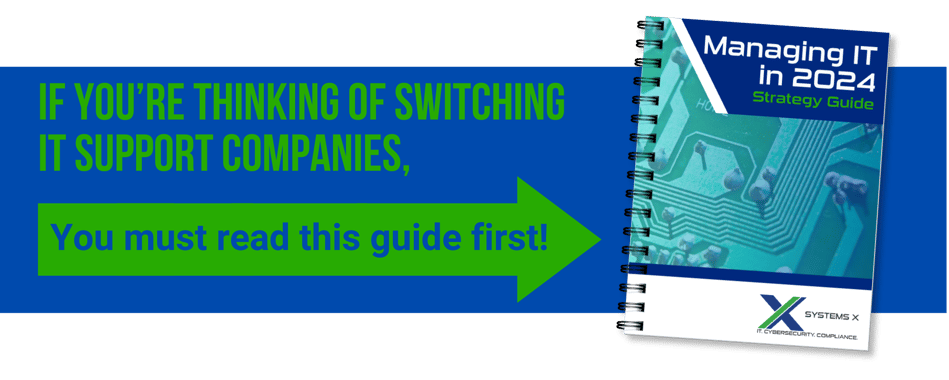4 Essential Security Tips for 2024
Simple antivirus programs are so 2023. In 2024, businesses will face sophisticated cyber threats, including ransomware, phishing attacks, and...
3 min read
 Mike Brattain
:
Aug 31, 2023 11:45:07 AM
Mike Brattain
:
Aug 31, 2023 11:45:07 AM

As cyber liability insurance becomes a necessity for all organizations, insurers have taken proactive steps to ensure their policyholders are adequately protected. One such measure is the requirement for insureds to implement multi-factor authentication (MFA). So, why do insurance providers insist on this additional layer of security?
Imagine a scenario where a cybercriminal manages to bypass traditional username and password credentials. This single point of vulnerability leaves businesses susceptible to devastating data breaches. By mandating MFA, insurers seek to improve their policyholders' defenses. MFA adds an extra layer of protection by requiring multiple forms of verification, making it significantly more difficult for unauthorized individuals to gain access.
Insurance providers recognize the value of prevention over recovery. Through the implementation of MFA, businesses can proactively curtail the risk of successful cyberattacks. This proactive stance is regarded by insurers as a robust risk management practice, reflecting a dedication to bolstered security measures. Consequently, companies with established MFA protocols may garner a more favorable perception from insurers, potentially resulting in enhanced coverage terms and reduced premiums.
From the insurer's standpoint, the core objective is to evaluate and mitigate risk. Mandating MFA for policyholders serves as a preemptive strategy to mitigate the likelihood of substantial cyber incidents. This proactive approach aligns harmoniously with industry best practices and serves to safeguard both the insurer and the policyholder. By enhancing authentication protocols, MFA significantly diminishes the probability of successful breaches, ultimately curtailing the potential for insurance claims and the associated financial ramifications.
Insurance providers also understand the importance of incident response planning. MFA aligns perfectly with this crucial aspect of cyber liability insurance. In the unfortunate event of a breach, having MFA in place can serve as an early warning system, allowing businesses to detect and respond to incidents more swiftly and effectively. By making it harder for attackers to gain unauthorized access, MFA buys precious time for incident response teams to spring into action and mitigate the impact of a cyber incident.
While every organization's infrastructure is unique, there are certain areas where MFA should be prioritized:
This includes customer portals, employee remote access, and any system accessible from the Internet. By implementing MFA here, you add an extra layer of protection against unauthorized entry, ensuring that only legitimate users can access your sensitive data from outside your network.
These are the keys to your kingdom. It is essential to enforce MFA for privileged accounts, such as those with administrative rights, as they hold the keys to critical systems and data. MFA adds an additional safeguard against unauthorized access attempts and helps prevent unauthorized changes or malicious actions.
With the rise of cloud computing, it's crucial to protect access to cloud-based applications and services. MFA should be implemented for cloud platforms, such as email services, customer relationship management systems, and file-sharing services. This ensures that even if an attacker manages to compromise a user's credentials, they will still need additional verification to gain access.
As more organizations embrace remote work, securing remote access becomes paramount. MFA should be strictly enforced for any remote access protocols, such as virtual private networks (VPNs) or remote desktop services. This adds an extra layer of protection to prevent unauthorized individuals from exploiting remote connections to breach your network.
Remember, these are just a few examples of where MFA should be enforced on your network. It's essential to conduct a comprehensive risk assessment and identify areas where sensitive data resides or where unauthorized access could have severe consequences.
The insistence of cyber liability insurance providers on implementing multi-factor authentication is a proactive measure to protect their insureds against cyber risks. It reinforces security, minimizes the chances of successful attacks, and demonstrates a commitment to strong risk management practices. By embracing MFA, businesses not only enhance their overall cybersecurity posture but also benefit from better coverage terms and lower insurance premiums. In a world where cyber threats are ever-evolving, multi-factor authentication is an essential tool to safeguard what truly matters—your sensitive data and business reputation.
The team at Systems X understands the evolving landscape of cyber threats and the importance of meeting cyber liability insurance requirements. We work closely with companies to ensure they have strong security measures in place, including the implementation of multi-factor authentication (MFA). Our dedicated experts guide businesses through the process of integrating MFA into their network infrastructure, identifying critical areas where it should be enforced, such as external-facing systems, administrative accounts, cloud applications, and remote access protocols.
By partnering with Systems X, companies can confidently meet the stringent requirements of cyber liability insurance providers, significantly reducing their risk of successful cyberattacks and demonstrating a commitment to strong security practices. Together, we build a strong defense against cyber threats, protecting sensitive data and preserving the reputation and financial well-being of our clients.


Simple antivirus programs are so 2023. In 2024, businesses will face sophisticated cyber threats, including ransomware, phishing attacks, and...

The role of technology in driving your organization’s success cannot be overstated. As a business owner or IT manager, you rely on your IT support...

The role of IT within SMBs continues to evolve dramatically in 2025. Businesses face increasingly complex demands around cybersecurity, compliance,...